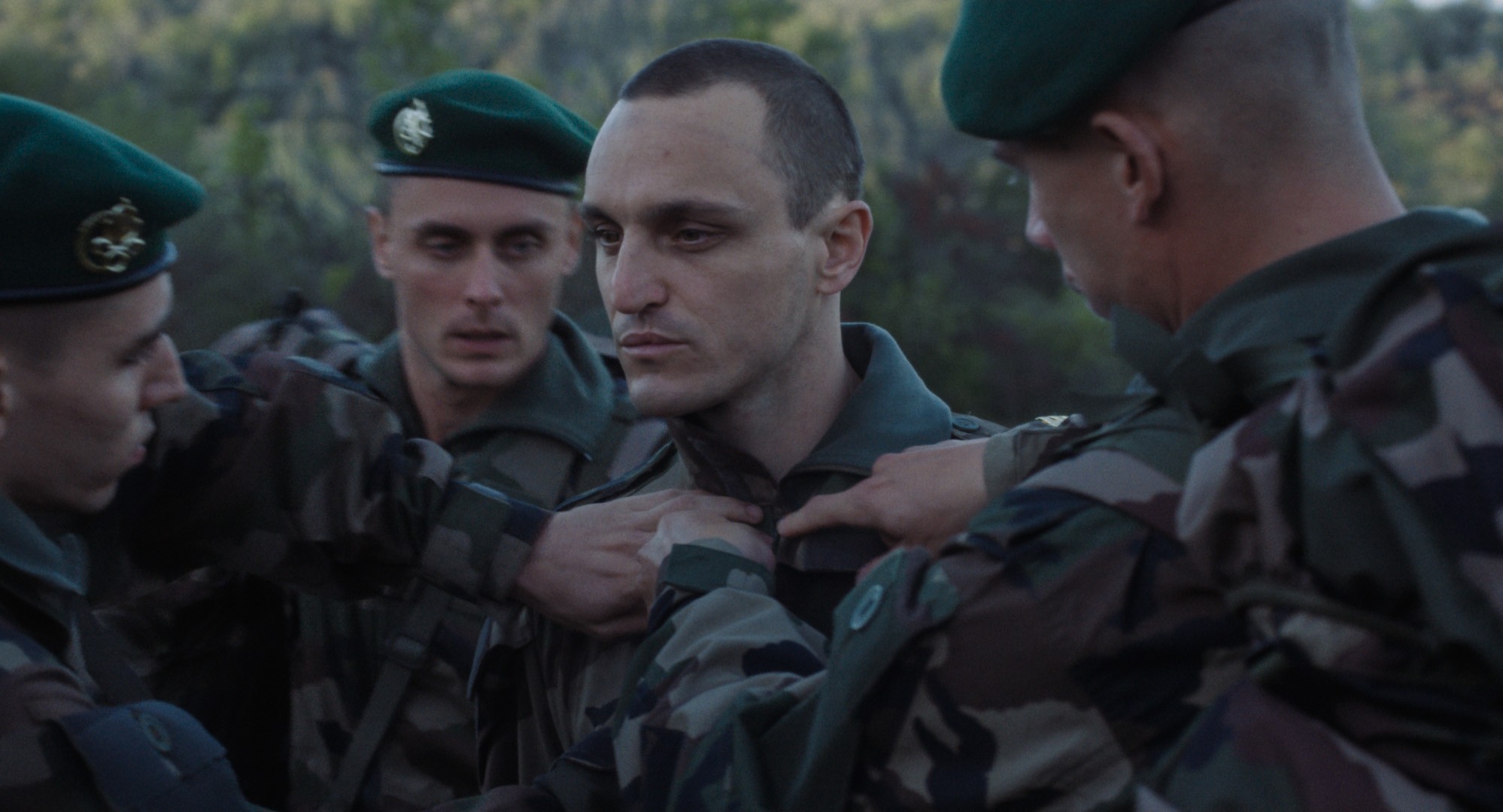To be blunt about it, we’re reaching the sad, maybe inevitable stage where Beau Travail and its famous closing sequence are becoming subject to the dreaded “Seinfeld Effect,” coined to note where the original value of something is diminished by successive imitations. It’s not that Denis’ film and Denis Levant’s death dance would ever lose their impact for those new or returning to it, but that a prospective viewer could see a weaker future rendering or a jaded, comic social-media reference to the scene first, and then afterward eventually seek out Beau Travail, greeting it with a bit of a “huh, that’s where that’s from” or underwhelmed reaction.
To Disco Boy’s credit, while its core themes and imagery are second-hand, it does attempt to build, expand on, perhaps modernize Beau Travail, not unlike Helena Wittmann’s recent Human Flowers of Flesh, which premiered last year at Locarno (and actually featured Lavant playing an incarnation of his Galoup character). It’s also perhaps the first leading role of his glittering career to date where Franz Rogowski is miscast, feeling inappropriate or perhaps too worldly for the naive military grunt at the center; either way, the film’s debuting director Giacomo Abbruzzese attempts drawing out a performance that hits predictable notes of machismo, despair, and anguish.
Disco Boy’s core theme is globalization, really, or the contingent woe we all share, through the violence of borders, forced migration, and enduring armed combat, even if no country has officially declared war. (Both in these generalized themes, and its frantic stylistic flexing, we’re reminded of Iñárritu, with a bit of dread.) Joining the Légion étrangère is a route to French citizenship for the Belarusian Aleksei (Rogowski), rather than a symbol of France’s wilting Napoleonic legacy as it is in Denis’ film. Hiding with a bunch of rowdy football fans to cross the border into Poland (and thus the European Union and its Schengen area), he has a traveling partner Mikhail (Michał Balicki) with what seems to be the same purpose; he tragically drowns as he makes his course, which can (cynically) be read as providing a bit of guilt to prop up Aleksei’s plot arc.
The film also offers up a dual protagonist, or double, of Aleksei. This is Jomo (Morr Ndiaye), a militant of MEND, a very appropriate acronym for the Movement for the Emancipation of the Niger Delta. Though a committed soldier to the cause––fighting for liberation and independence as a free, breakaway state on the southern tip of Nigeria––he longs for his own parallel European migration: speaking to his sister Udoka (the Ivorian artist and activist Laëtitia Ky), as they’re together in a folkloric, psychedelic-tinged local ritual, he yearns, somehow, for the European club scene––to indeed become, in his very words, a “disco boy.”
As disproportionately armed belligerents of the two sides, Aleks (as he becomes known for short, hinting at his gradual Europeanisation) and Jono’s destines become intertwined, and Abbruzzese strongly implies a metaphysical merging or symbolic crossfading of them as well. It’s not fully stated, but we imagine the legion has the right to intervene on behalf of the Nigerian government due to their enduring colonial connection to neighboring states of Cameroon and Benin. Abbruzzese, together with acclaimed cinematographer Hélène Louvart, shoots these combat scenes in a hard-edged, muscular manner. It’s all diverting enough, but we’re very far from how Beau Travail turned these French military adventures in foreign climes into a subversively romantic dream, all the more cutting and insightful about masculine and colonial power dynamics as we glimpsed the claustrophobic pointlessness of their endless calisthenics.
By the third act we’re in Paris, and often on the aggressively strobe-dotted dance floor of an underground nightclub where Abbruzzese wants to show the aftereffects of Aleks’s––and thus the French body politic’s––colonial conquest, which sticks to him like a haunting, folding in the implication of the prior ritual scene, or a drug flashback. Then it concludes, almost obligatorily, with Rogowski swaying his hips, aurally caressed by Vitalic’s booming electronic beats. I’ll tell you this much: they’re a far cry from Corona’s.
Disco Boy premiered at Berlinale 2023.

